RMIT University Nursing: Clinical Mentoring Plan Report and Analysis
VerifiedAdded on 2023/04/25
|15
|4474
|169
Report
AI Summary
This report presents a comprehensive clinical mentoring plan designed for nursing students, focusing on the crucial aspects of mentorship within a healthcare setting. It delves into the roles and responsibilities of both mentors and mentees, emphasizing the importance of effective communication, skill development, and the establishment of realistic goals. The report analyzes a specific scenario involving a nursing student in mental healthcare, highlighting the challenges faced and the benefits of mentorship. It outlines the objectives of mentoring sessions, including enhancing clinical skills, and discusses various leadership styles. The document also includes a review of relevant literature to support the analysis and provides recommendations for successful mentoring practices. The analysis includes the impact of leadership, different styles, strengths, and weaknesses, along with the settings of the mentor and mentee and their advantages and disadvantages, ultimately aiming to improve patient outcomes and enhance the professional development of nursing students. References are considered in describing the recommendation and objectives of the mentoring session.
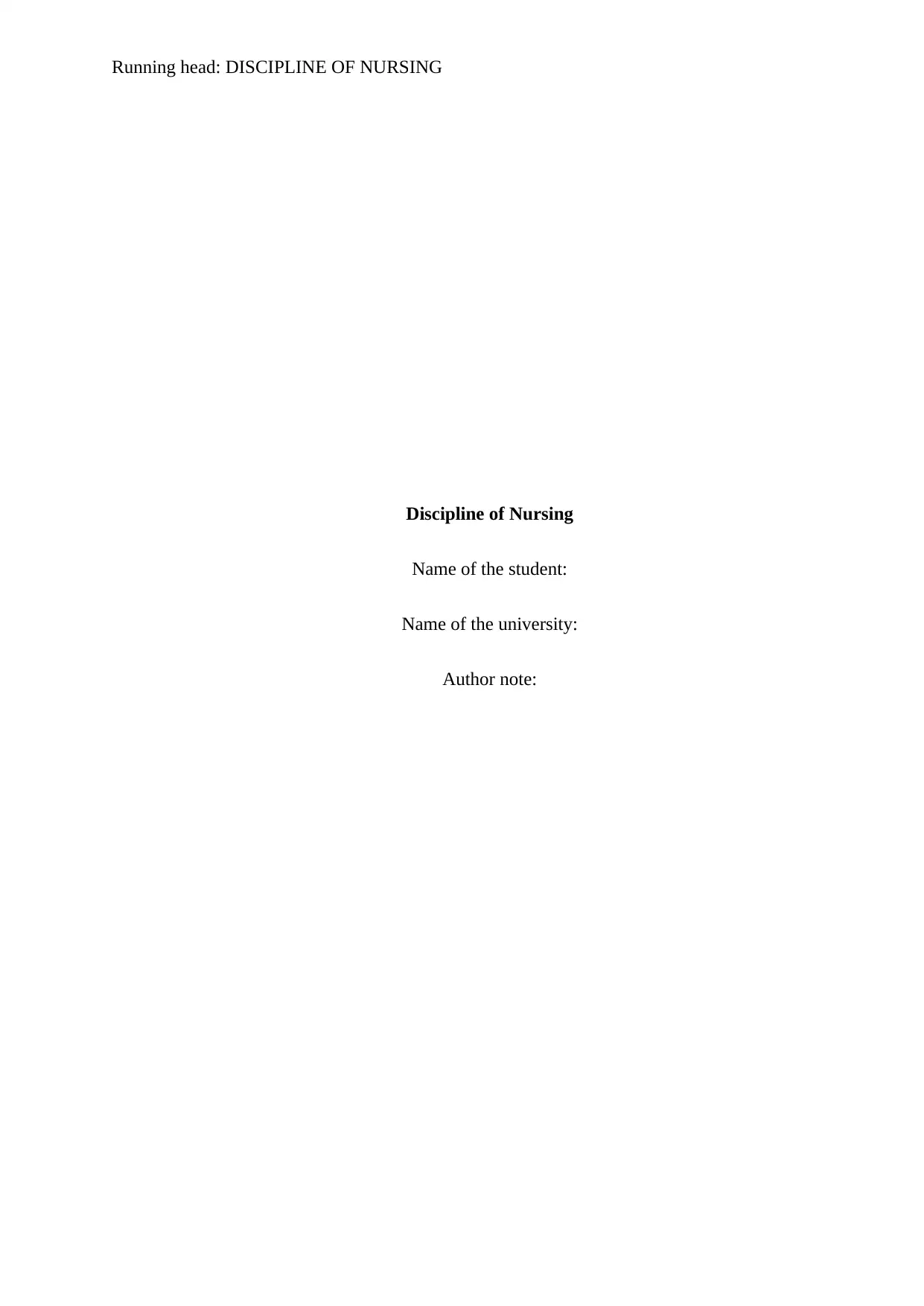
Running head: DISCIPLINE OF NURSING
Discipline of Nursing
Name of the student:
Name of the university:
Author note:
Discipline of Nursing
Name of the student:
Name of the university:
Author note:
Paraphrase This Document
Need a fresh take? Get an instant paraphrase of this document with our AI Paraphraser
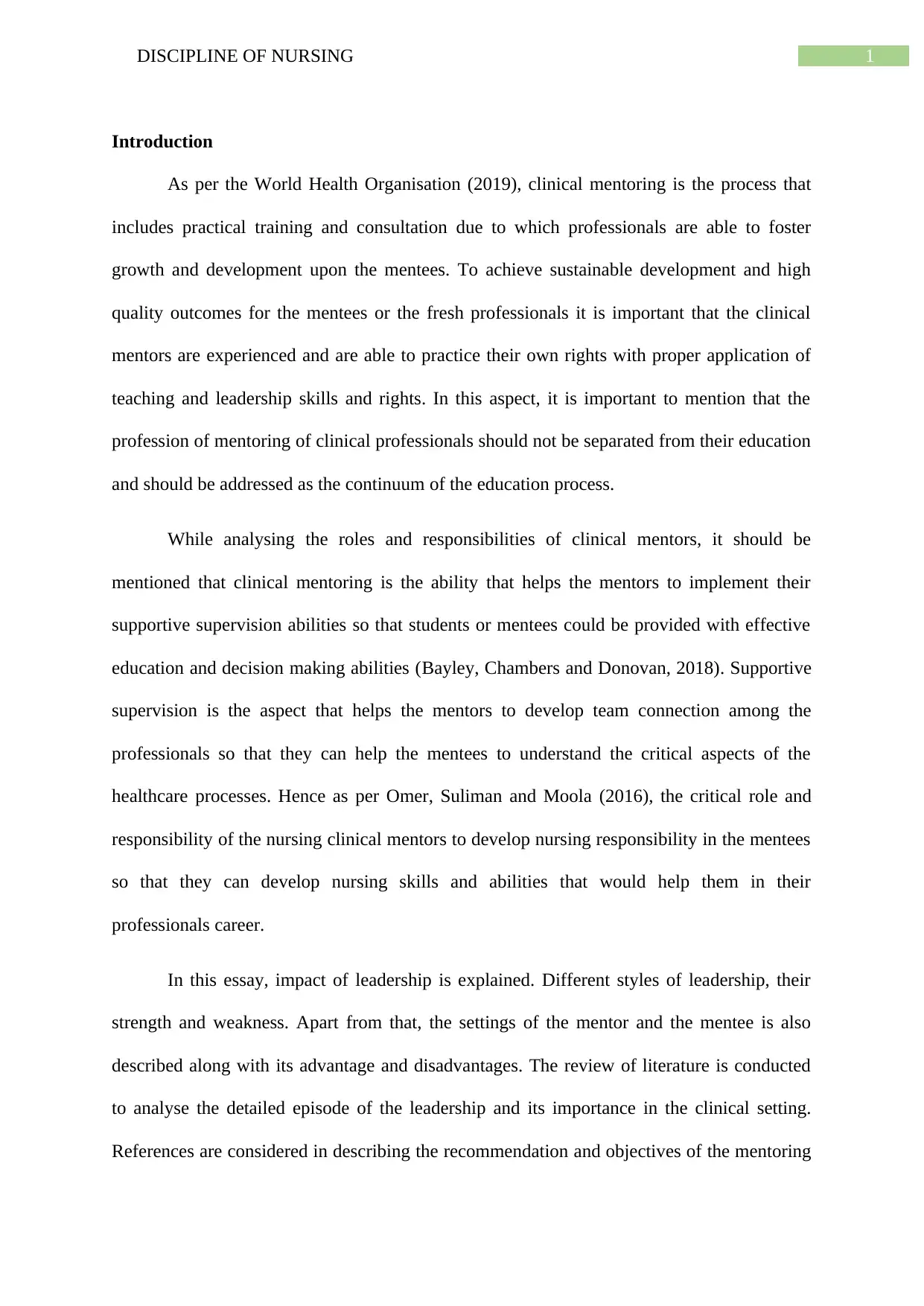
1DISCIPLINE OF NURSING
Introduction
As per the World Health Organisation (2019), clinical mentoring is the process that
includes practical training and consultation due to which professionals are able to foster
growth and development upon the mentees. To achieve sustainable development and high
quality outcomes for the mentees or the fresh professionals it is important that the clinical
mentors are experienced and are able to practice their own rights with proper application of
teaching and leadership skills and rights. In this aspect, it is important to mention that the
profession of mentoring of clinical professionals should not be separated from their education
and should be addressed as the continuum of the education process.
While analysing the roles and responsibilities of clinical mentors, it should be
mentioned that clinical mentoring is the ability that helps the mentors to implement their
supportive supervision abilities so that students or mentees could be provided with effective
education and decision making abilities (Bayley, Chambers and Donovan, 2018). Supportive
supervision is the aspect that helps the mentors to develop team connection among the
professionals so that they can help the mentees to understand the critical aspects of the
healthcare processes. Hence as per Omer, Suliman and Moola (2016), the critical role and
responsibility of the nursing clinical mentors to develop nursing responsibility in the mentees
so that they can develop nursing skills and abilities that would help them in their
professionals career.
In this essay, impact of leadership is explained. Different styles of leadership, their
strength and weakness. Apart from that, the settings of the mentor and the mentee is also
described along with its advantage and disadvantages. The review of literature is conducted
to analyse the detailed episode of the leadership and its importance in the clinical setting.
References are considered in describing the recommendation and objectives of the mentoring
Introduction
As per the World Health Organisation (2019), clinical mentoring is the process that
includes practical training and consultation due to which professionals are able to foster
growth and development upon the mentees. To achieve sustainable development and high
quality outcomes for the mentees or the fresh professionals it is important that the clinical
mentors are experienced and are able to practice their own rights with proper application of
teaching and leadership skills and rights. In this aspect, it is important to mention that the
profession of mentoring of clinical professionals should not be separated from their education
and should be addressed as the continuum of the education process.
While analysing the roles and responsibilities of clinical mentors, it should be
mentioned that clinical mentoring is the ability that helps the mentors to implement their
supportive supervision abilities so that students or mentees could be provided with effective
education and decision making abilities (Bayley, Chambers and Donovan, 2018). Supportive
supervision is the aspect that helps the mentors to develop team connection among the
professionals so that they can help the mentees to understand the critical aspects of the
healthcare processes. Hence as per Omer, Suliman and Moola (2016), the critical role and
responsibility of the nursing clinical mentors to develop nursing responsibility in the mentees
so that they can develop nursing skills and abilities that would help them in their
professionals career.
In this essay, impact of leadership is explained. Different styles of leadership, their
strength and weakness. Apart from that, the settings of the mentor and the mentee is also
described along with its advantage and disadvantages. The review of literature is conducted
to analyse the detailed episode of the leadership and its importance in the clinical setting.
References are considered in describing the recommendation and objectives of the mentoring
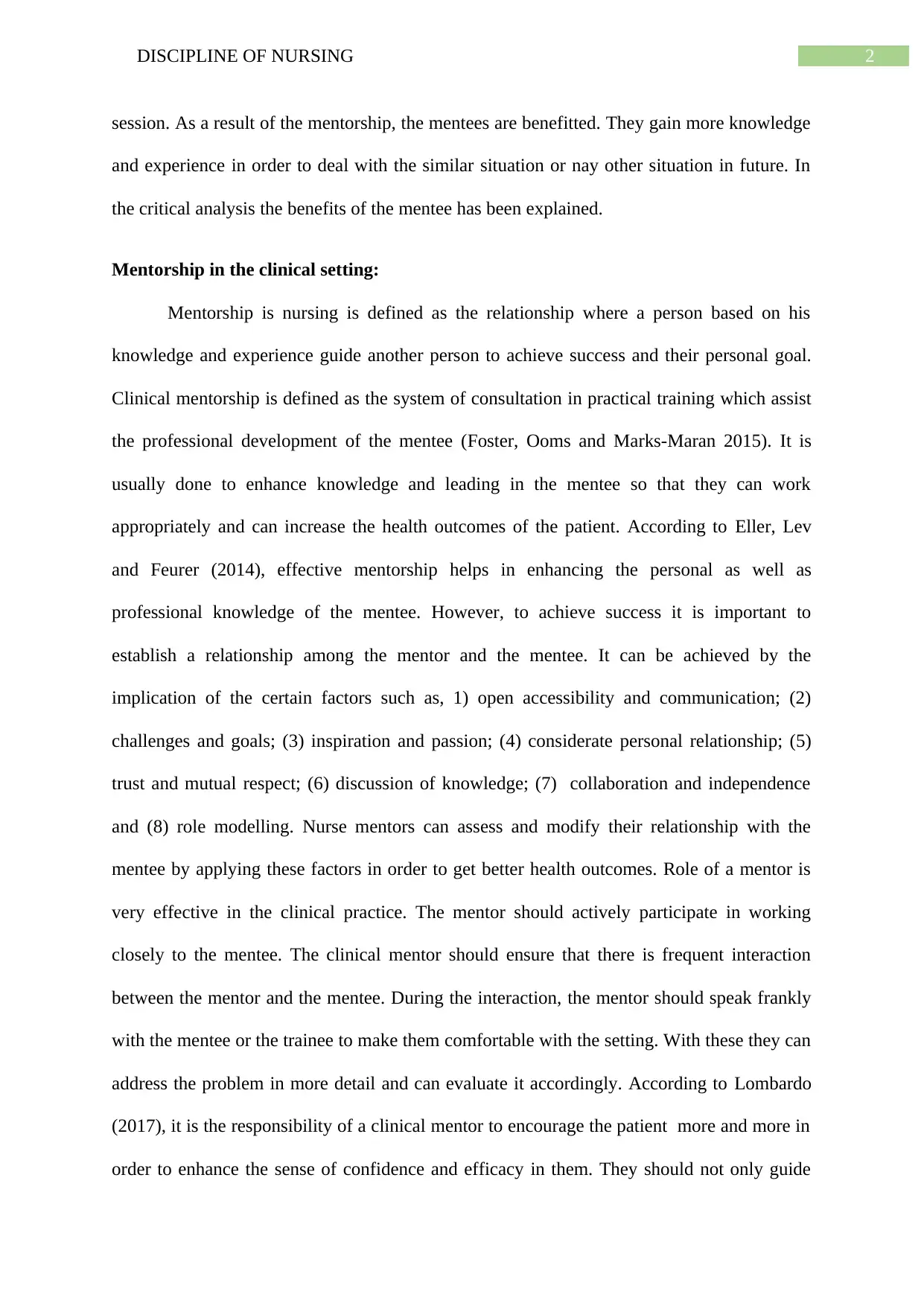
2DISCIPLINE OF NURSING
session. As a result of the mentorship, the mentees are benefitted. They gain more knowledge
and experience in order to deal with the similar situation or nay other situation in future. In
the critical analysis the benefits of the mentee has been explained.
Mentorship in the clinical setting:
Mentorship is nursing is defined as the relationship where a person based on his
knowledge and experience guide another person to achieve success and their personal goal.
Clinical mentorship is defined as the system of consultation in practical training which assist
the professional development of the mentee (Foster, Ooms and Marks-Maran 2015). It is
usually done to enhance knowledge and leading in the mentee so that they can work
appropriately and can increase the health outcomes of the patient. According to Eller, Lev
and Feurer (2014), effective mentorship helps in enhancing the personal as well as
professional knowledge of the mentee. However, to achieve success it is important to
establish a relationship among the mentor and the mentee. It can be achieved by the
implication of the certain factors such as, 1) open accessibility and communication; (2)
challenges and goals; (3) inspiration and passion; (4) considerate personal relationship; (5)
trust and mutual respect; (6) discussion of knowledge; (7) collaboration and independence
and (8) role modelling. Nurse mentors can assess and modify their relationship with the
mentee by applying these factors in order to get better health outcomes. Role of a mentor is
very effective in the clinical practice. The mentor should actively participate in working
closely to the mentee. The clinical mentor should ensure that there is frequent interaction
between the mentor and the mentee. During the interaction, the mentor should speak frankly
with the mentee or the trainee to make them comfortable with the setting. With these they can
address the problem in more detail and can evaluate it accordingly. According to Lombardo
(2017), it is the responsibility of a clinical mentor to encourage the patient more and more in
order to enhance the sense of confidence and efficacy in them. They should not only guide
session. As a result of the mentorship, the mentees are benefitted. They gain more knowledge
and experience in order to deal with the similar situation or nay other situation in future. In
the critical analysis the benefits of the mentee has been explained.
Mentorship in the clinical setting:
Mentorship is nursing is defined as the relationship where a person based on his
knowledge and experience guide another person to achieve success and their personal goal.
Clinical mentorship is defined as the system of consultation in practical training which assist
the professional development of the mentee (Foster, Ooms and Marks-Maran 2015). It is
usually done to enhance knowledge and leading in the mentee so that they can work
appropriately and can increase the health outcomes of the patient. According to Eller, Lev
and Feurer (2014), effective mentorship helps in enhancing the personal as well as
professional knowledge of the mentee. However, to achieve success it is important to
establish a relationship among the mentor and the mentee. It can be achieved by the
implication of the certain factors such as, 1) open accessibility and communication; (2)
challenges and goals; (3) inspiration and passion; (4) considerate personal relationship; (5)
trust and mutual respect; (6) discussion of knowledge; (7) collaboration and independence
and (8) role modelling. Nurse mentors can assess and modify their relationship with the
mentee by applying these factors in order to get better health outcomes. Role of a mentor is
very effective in the clinical practice. The mentor should actively participate in working
closely to the mentee. The clinical mentor should ensure that there is frequent interaction
between the mentor and the mentee. During the interaction, the mentor should speak frankly
with the mentee or the trainee to make them comfortable with the setting. With these they can
address the problem in more detail and can evaluate it accordingly. According to Lombardo
(2017), it is the responsibility of a clinical mentor to encourage the patient more and more in
order to enhance the sense of confidence and efficacy in them. They should not only guide
⊘ This is a preview!⊘
Do you want full access?
Subscribe today to unlock all pages.

Trusted by 1+ million students worldwide
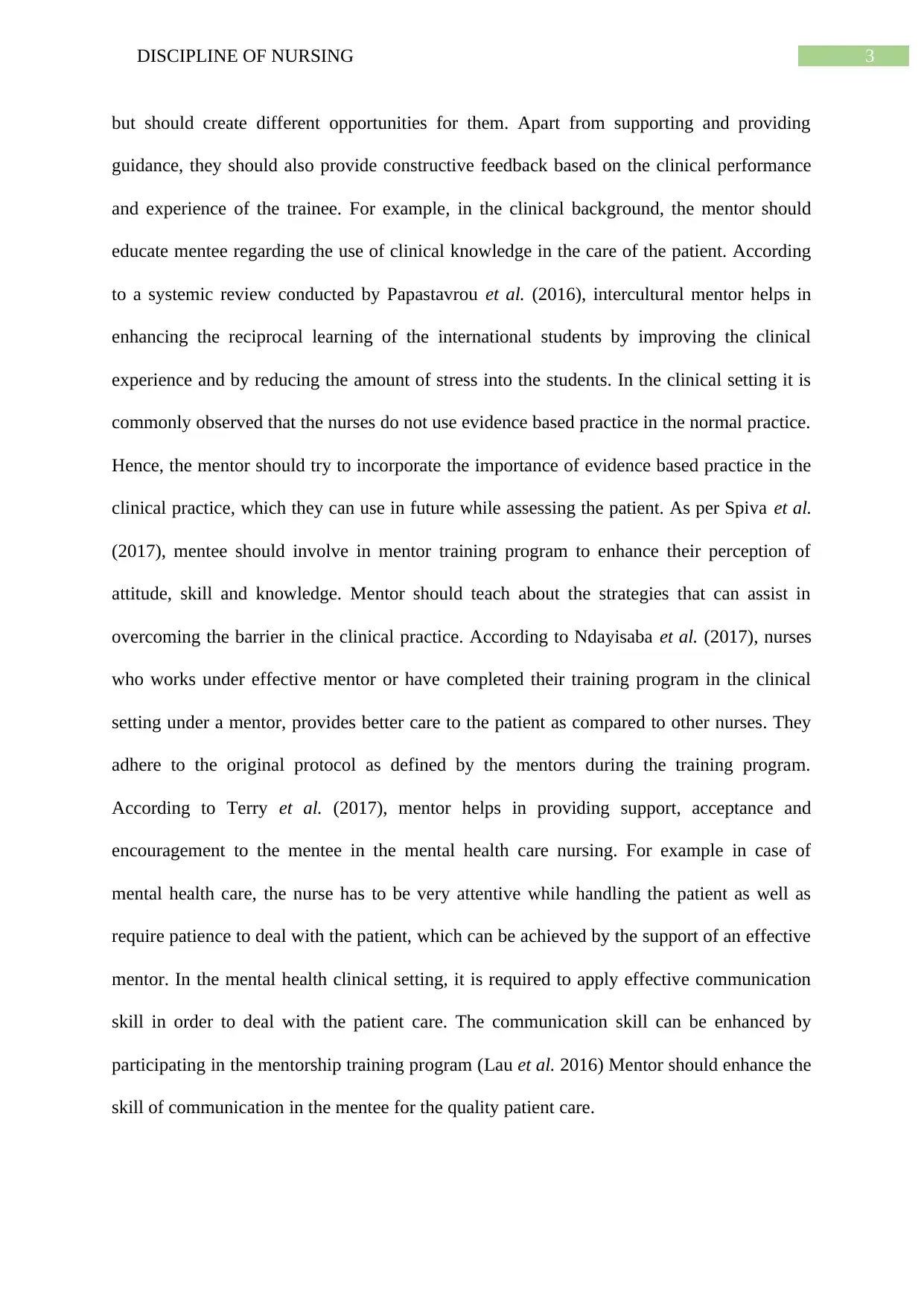
3DISCIPLINE OF NURSING
but should create different opportunities for them. Apart from supporting and providing
guidance, they should also provide constructive feedback based on the clinical performance
and experience of the trainee. For example, in the clinical background, the mentor should
educate mentee regarding the use of clinical knowledge in the care of the patient. According
to a systemic review conducted by Papastavrou et al. (2016), intercultural mentor helps in
enhancing the reciprocal learning of the international students by improving the clinical
experience and by reducing the amount of stress into the students. In the clinical setting it is
commonly observed that the nurses do not use evidence based practice in the normal practice.
Hence, the mentor should try to incorporate the importance of evidence based practice in the
clinical practice, which they can use in future while assessing the patient. As per Spiva et al.
(2017), mentee should involve in mentor training program to enhance their perception of
attitude, skill and knowledge. Mentor should teach about the strategies that can assist in
overcoming the barrier in the clinical practice. According to Ndayisaba et al. (2017), nurses
who works under effective mentor or have completed their training program in the clinical
setting under a mentor, provides better care to the patient as compared to other nurses. They
adhere to the original protocol as defined by the mentors during the training program.
According to Terry et al. (2017), mentor helps in providing support, acceptance and
encouragement to the mentee in the mental health care nursing. For example in case of
mental health care, the nurse has to be very attentive while handling the patient as well as
require patience to deal with the patient, which can be achieved by the support of an effective
mentor. In the mental health clinical setting, it is required to apply effective communication
skill in order to deal with the patient care. The communication skill can be enhanced by
participating in the mentorship training program (Lau et al. 2016) Mentor should enhance the
skill of communication in the mentee for the quality patient care.
but should create different opportunities for them. Apart from supporting and providing
guidance, they should also provide constructive feedback based on the clinical performance
and experience of the trainee. For example, in the clinical background, the mentor should
educate mentee regarding the use of clinical knowledge in the care of the patient. According
to a systemic review conducted by Papastavrou et al. (2016), intercultural mentor helps in
enhancing the reciprocal learning of the international students by improving the clinical
experience and by reducing the amount of stress into the students. In the clinical setting it is
commonly observed that the nurses do not use evidence based practice in the normal practice.
Hence, the mentor should try to incorporate the importance of evidence based practice in the
clinical practice, which they can use in future while assessing the patient. As per Spiva et al.
(2017), mentee should involve in mentor training program to enhance their perception of
attitude, skill and knowledge. Mentor should teach about the strategies that can assist in
overcoming the barrier in the clinical practice. According to Ndayisaba et al. (2017), nurses
who works under effective mentor or have completed their training program in the clinical
setting under a mentor, provides better care to the patient as compared to other nurses. They
adhere to the original protocol as defined by the mentors during the training program.
According to Terry et al. (2017), mentor helps in providing support, acceptance and
encouragement to the mentee in the mental health care nursing. For example in case of
mental health care, the nurse has to be very attentive while handling the patient as well as
require patience to deal with the patient, which can be achieved by the support of an effective
mentor. In the mental health clinical setting, it is required to apply effective communication
skill in order to deal with the patient care. The communication skill can be enhanced by
participating in the mentorship training program (Lau et al. 2016) Mentor should enhance the
skill of communication in the mentee for the quality patient care.
Paraphrase This Document
Need a fresh take? Get an instant paraphrase of this document with our AI Paraphraser
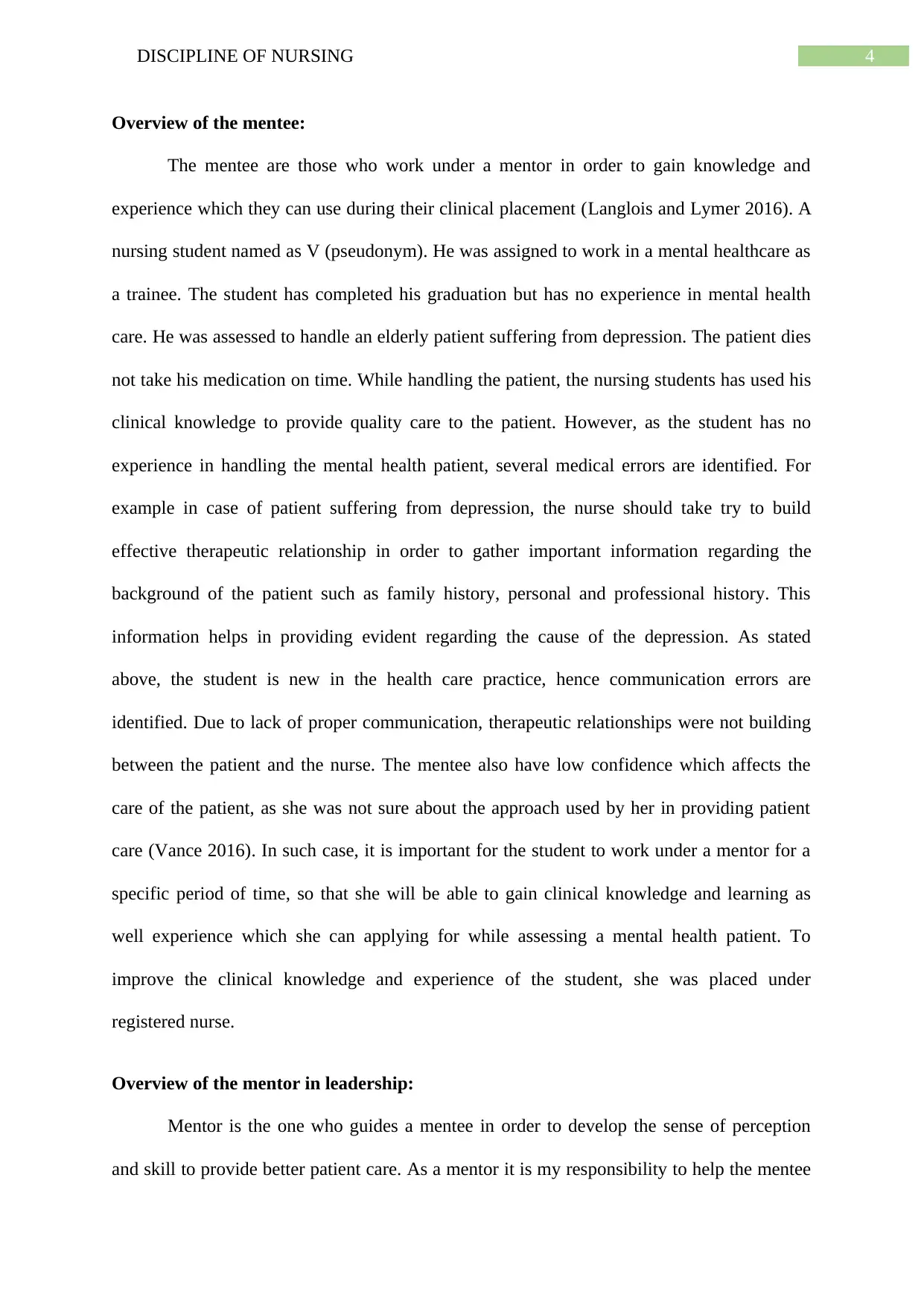
4DISCIPLINE OF NURSING
Overview of the mentee:
The mentee are those who work under a mentor in order to gain knowledge and
experience which they can use during their clinical placement (Langlois and Lymer 2016). A
nursing student named as V (pseudonym). He was assigned to work in a mental healthcare as
a trainee. The student has completed his graduation but has no experience in mental health
care. He was assessed to handle an elderly patient suffering from depression. The patient dies
not take his medication on time. While handling the patient, the nursing students has used his
clinical knowledge to provide quality care to the patient. However, as the student has no
experience in handling the mental health patient, several medical errors are identified. For
example in case of patient suffering from depression, the nurse should take try to build
effective therapeutic relationship in order to gather important information regarding the
background of the patient such as family history, personal and professional history. This
information helps in providing evident regarding the cause of the depression. As stated
above, the student is new in the health care practice, hence communication errors are
identified. Due to lack of proper communication, therapeutic relationships were not building
between the patient and the nurse. The mentee also have low confidence which affects the
care of the patient, as she was not sure about the approach used by her in providing patient
care (Vance 2016). In such case, it is important for the student to work under a mentor for a
specific period of time, so that she will be able to gain clinical knowledge and learning as
well experience which she can applying for while assessing a mental health patient. To
improve the clinical knowledge and experience of the student, she was placed under
registered nurse.
Overview of the mentor in leadership:
Mentor is the one who guides a mentee in order to develop the sense of perception
and skill to provide better patient care. As a mentor it is my responsibility to help the mentee
Overview of the mentee:
The mentee are those who work under a mentor in order to gain knowledge and
experience which they can use during their clinical placement (Langlois and Lymer 2016). A
nursing student named as V (pseudonym). He was assigned to work in a mental healthcare as
a trainee. The student has completed his graduation but has no experience in mental health
care. He was assessed to handle an elderly patient suffering from depression. The patient dies
not take his medication on time. While handling the patient, the nursing students has used his
clinical knowledge to provide quality care to the patient. However, as the student has no
experience in handling the mental health patient, several medical errors are identified. For
example in case of patient suffering from depression, the nurse should take try to build
effective therapeutic relationship in order to gather important information regarding the
background of the patient such as family history, personal and professional history. This
information helps in providing evident regarding the cause of the depression. As stated
above, the student is new in the health care practice, hence communication errors are
identified. Due to lack of proper communication, therapeutic relationships were not building
between the patient and the nurse. The mentee also have low confidence which affects the
care of the patient, as she was not sure about the approach used by her in providing patient
care (Vance 2016). In such case, it is important for the student to work under a mentor for a
specific period of time, so that she will be able to gain clinical knowledge and learning as
well experience which she can applying for while assessing a mental health patient. To
improve the clinical knowledge and experience of the student, she was placed under
registered nurse.
Overview of the mentor in leadership:
Mentor is the one who guides a mentee in order to develop the sense of perception
and skill to provide better patient care. As a mentor it is my responsibility to help the mentee
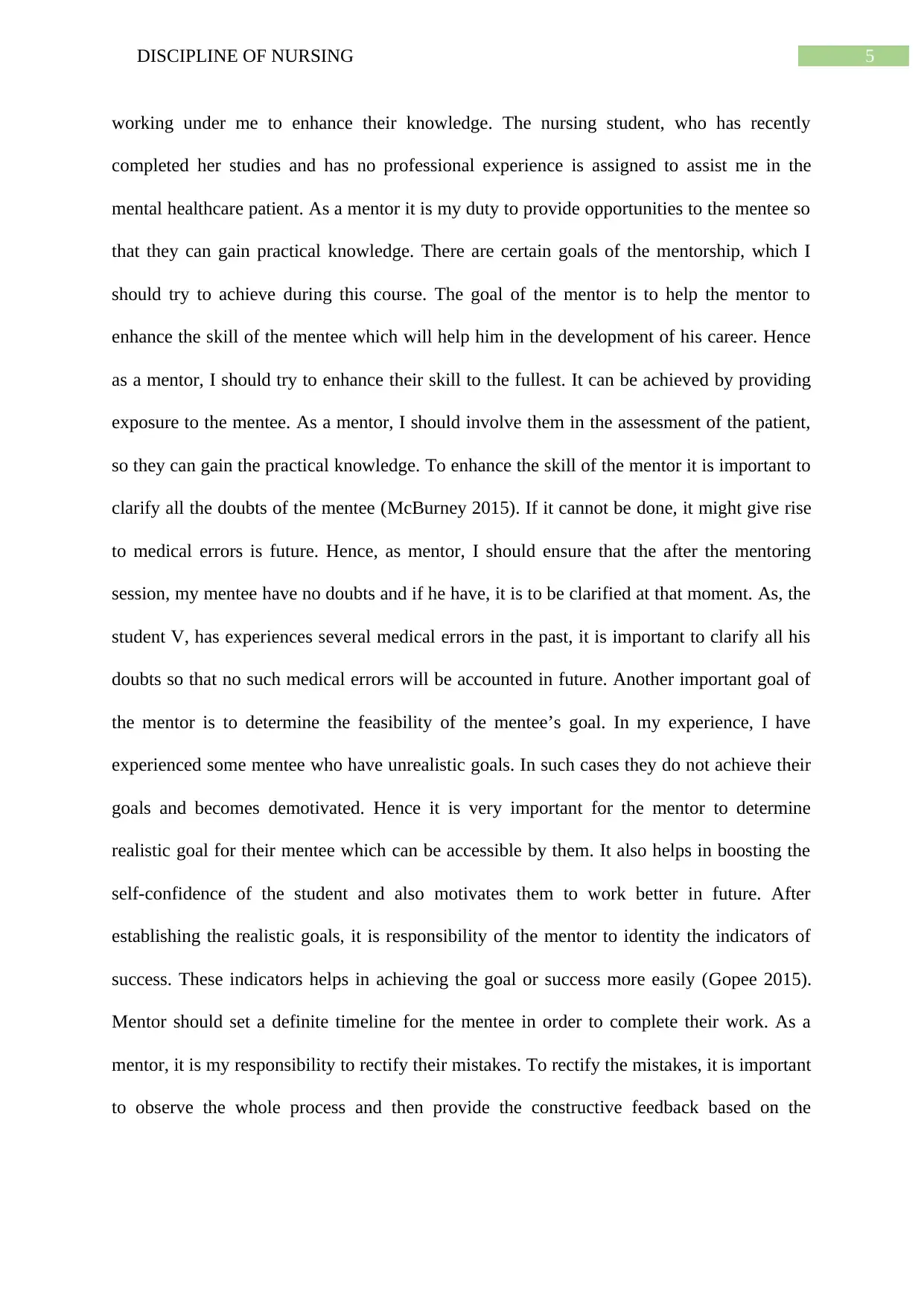
5DISCIPLINE OF NURSING
working under me to enhance their knowledge. The nursing student, who has recently
completed her studies and has no professional experience is assigned to assist me in the
mental healthcare patient. As a mentor it is my duty to provide opportunities to the mentee so
that they can gain practical knowledge. There are certain goals of the mentorship, which I
should try to achieve during this course. The goal of the mentor is to help the mentor to
enhance the skill of the mentee which will help him in the development of his career. Hence
as a mentor, I should try to enhance their skill to the fullest. It can be achieved by providing
exposure to the mentee. As a mentor, I should involve them in the assessment of the patient,
so they can gain the practical knowledge. To enhance the skill of the mentor it is important to
clarify all the doubts of the mentee (McBurney 2015). If it cannot be done, it might give rise
to medical errors is future. Hence, as mentor, I should ensure that the after the mentoring
session, my mentee have no doubts and if he have, it is to be clarified at that moment. As, the
student V, has experiences several medical errors in the past, it is important to clarify all his
doubts so that no such medical errors will be accounted in future. Another important goal of
the mentor is to determine the feasibility of the mentee’s goal. In my experience, I have
experienced some mentee who have unrealistic goals. In such cases they do not achieve their
goals and becomes demotivated. Hence it is very important for the mentor to determine
realistic goal for their mentee which can be accessible by them. It also helps in boosting the
self-confidence of the student and also motivates them to work better in future. After
establishing the realistic goals, it is responsibility of the mentor to identity the indicators of
success. These indicators helps in achieving the goal or success more easily (Gopee 2015).
Mentor should set a definite timeline for the mentee in order to complete their work. As a
mentor, it is my responsibility to rectify their mistakes. To rectify the mistakes, it is important
to observe the whole process and then provide the constructive feedback based on the
working under me to enhance their knowledge. The nursing student, who has recently
completed her studies and has no professional experience is assigned to assist me in the
mental healthcare patient. As a mentor it is my duty to provide opportunities to the mentee so
that they can gain practical knowledge. There are certain goals of the mentorship, which I
should try to achieve during this course. The goal of the mentor is to help the mentor to
enhance the skill of the mentee which will help him in the development of his career. Hence
as a mentor, I should try to enhance their skill to the fullest. It can be achieved by providing
exposure to the mentee. As a mentor, I should involve them in the assessment of the patient,
so they can gain the practical knowledge. To enhance the skill of the mentor it is important to
clarify all the doubts of the mentee (McBurney 2015). If it cannot be done, it might give rise
to medical errors is future. Hence, as mentor, I should ensure that the after the mentoring
session, my mentee have no doubts and if he have, it is to be clarified at that moment. As, the
student V, has experiences several medical errors in the past, it is important to clarify all his
doubts so that no such medical errors will be accounted in future. Another important goal of
the mentor is to determine the feasibility of the mentee’s goal. In my experience, I have
experienced some mentee who have unrealistic goals. In such cases they do not achieve their
goals and becomes demotivated. Hence it is very important for the mentor to determine
realistic goal for their mentee which can be accessible by them. It also helps in boosting the
self-confidence of the student and also motivates them to work better in future. After
establishing the realistic goals, it is responsibility of the mentor to identity the indicators of
success. These indicators helps in achieving the goal or success more easily (Gopee 2015).
Mentor should set a definite timeline for the mentee in order to complete their work. As a
mentor, it is my responsibility to rectify their mistakes. To rectify the mistakes, it is important
to observe the whole process and then provide the constructive feedback based on the
⊘ This is a preview!⊘
Do you want full access?
Subscribe today to unlock all pages.

Trusted by 1+ million students worldwide
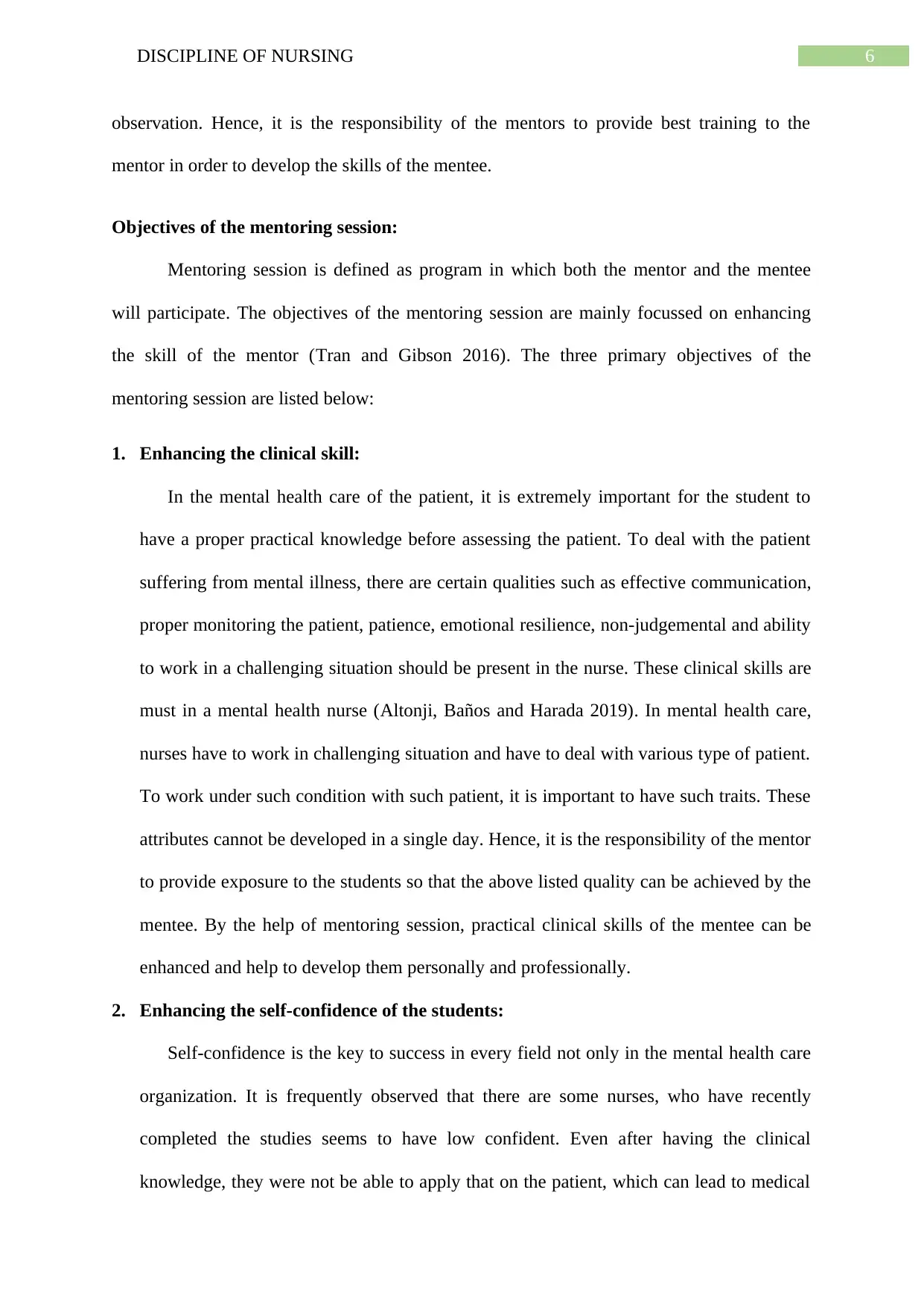
6DISCIPLINE OF NURSING
observation. Hence, it is the responsibility of the mentors to provide best training to the
mentor in order to develop the skills of the mentee.
Objectives of the mentoring session:
Mentoring session is defined as program in which both the mentor and the mentee
will participate. The objectives of the mentoring session are mainly focussed on enhancing
the skill of the mentor (Tran and Gibson 2016). The three primary objectives of the
mentoring session are listed below:
1. Enhancing the clinical skill:
In the mental health care of the patient, it is extremely important for the student to
have a proper practical knowledge before assessing the patient. To deal with the patient
suffering from mental illness, there are certain qualities such as effective communication,
proper monitoring the patient, patience, emotional resilience, non-judgemental and ability
to work in a challenging situation should be present in the nurse. These clinical skills are
must in a mental health nurse (Altonji, Baños and Harada 2019). In mental health care,
nurses have to work in challenging situation and have to deal with various type of patient.
To work under such condition with such patient, it is important to have such traits. These
attributes cannot be developed in a single day. Hence, it is the responsibility of the mentor
to provide exposure to the students so that the above listed quality can be achieved by the
mentee. By the help of mentoring session, practical clinical skills of the mentee can be
enhanced and help to develop them personally and professionally.
2. Enhancing the self-confidence of the students:
Self-confidence is the key to success in every field not only in the mental health care
organization. It is frequently observed that there are some nurses, who have recently
completed the studies seems to have low confident. Even after having the clinical
knowledge, they were not be able to apply that on the patient, which can lead to medical
observation. Hence, it is the responsibility of the mentors to provide best training to the
mentor in order to develop the skills of the mentee.
Objectives of the mentoring session:
Mentoring session is defined as program in which both the mentor and the mentee
will participate. The objectives of the mentoring session are mainly focussed on enhancing
the skill of the mentor (Tran and Gibson 2016). The three primary objectives of the
mentoring session are listed below:
1. Enhancing the clinical skill:
In the mental health care of the patient, it is extremely important for the student to
have a proper practical knowledge before assessing the patient. To deal with the patient
suffering from mental illness, there are certain qualities such as effective communication,
proper monitoring the patient, patience, emotional resilience, non-judgemental and ability
to work in a challenging situation should be present in the nurse. These clinical skills are
must in a mental health nurse (Altonji, Baños and Harada 2019). In mental health care,
nurses have to work in challenging situation and have to deal with various type of patient.
To work under such condition with such patient, it is important to have such traits. These
attributes cannot be developed in a single day. Hence, it is the responsibility of the mentor
to provide exposure to the students so that the above listed quality can be achieved by the
mentee. By the help of mentoring session, practical clinical skills of the mentee can be
enhanced and help to develop them personally and professionally.
2. Enhancing the self-confidence of the students:
Self-confidence is the key to success in every field not only in the mental health care
organization. It is frequently observed that there are some nurses, who have recently
completed the studies seems to have low confident. Even after having the clinical
knowledge, they were not be able to apply that on the patient, which can lead to medical
Paraphrase This Document
Need a fresh take? Get an instant paraphrase of this document with our AI Paraphraser
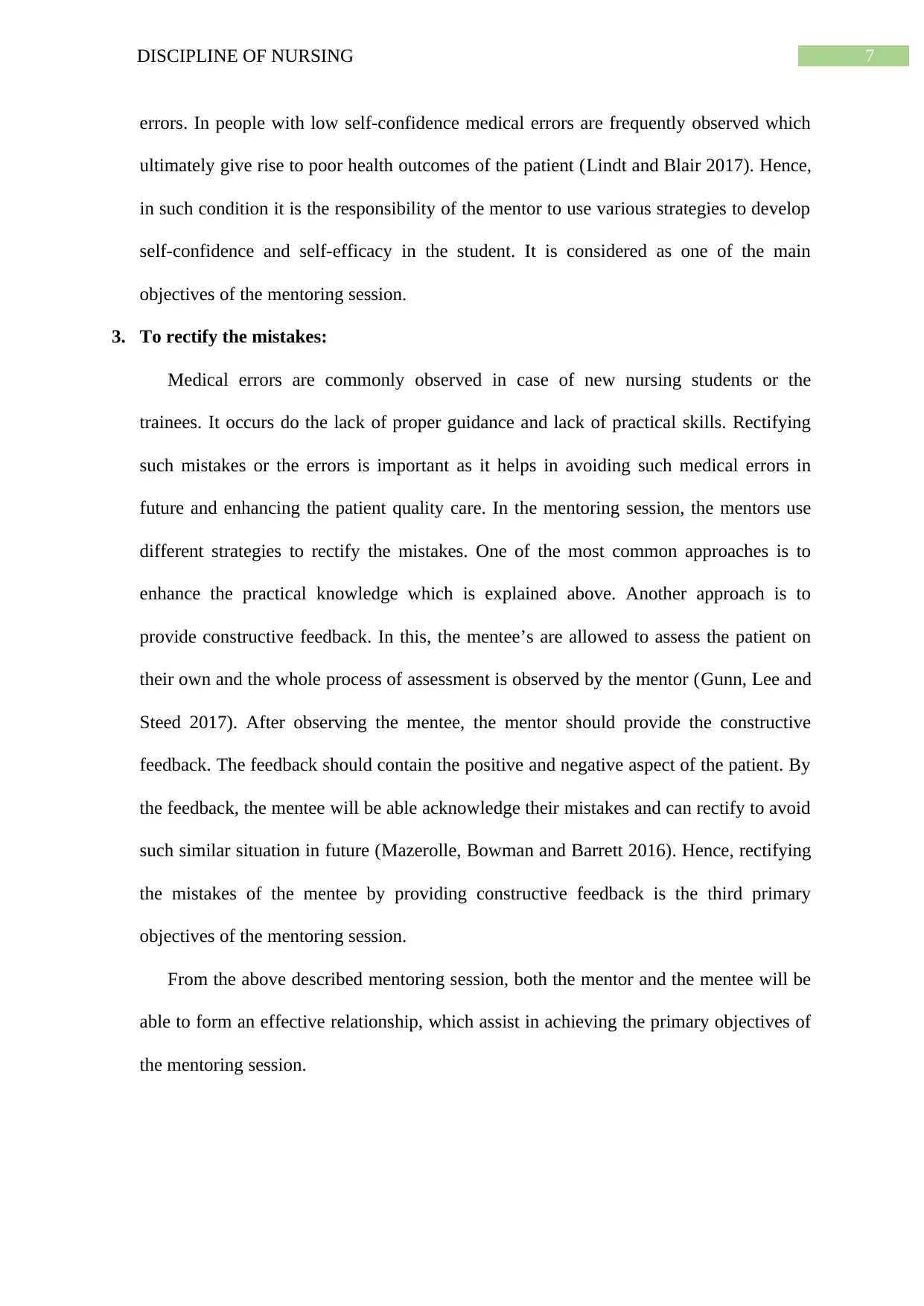
7DISCIPLINE OF NURSING
errors. In people with low self-confidence medical errors are frequently observed which
ultimately give rise to poor health outcomes of the patient (Lindt and Blair 2017). Hence,
in such condition it is the responsibility of the mentor to use various strategies to develop
self-confidence and self-efficacy in the student. It is considered as one of the main
objectives of the mentoring session.
3. To rectify the mistakes:
Medical errors are commonly observed in case of new nursing students or the
trainees. It occurs do the lack of proper guidance and lack of practical skills. Rectifying
such mistakes or the errors is important as it helps in avoiding such medical errors in
future and enhancing the patient quality care. In the mentoring session, the mentors use
different strategies to rectify the mistakes. One of the most common approaches is to
enhance the practical knowledge which is explained above. Another approach is to
provide constructive feedback. In this, the mentee’s are allowed to assess the patient on
their own and the whole process of assessment is observed by the mentor (Gunn, Lee and
Steed 2017). After observing the mentee, the mentor should provide the constructive
feedback. The feedback should contain the positive and negative aspect of the patient. By
the feedback, the mentee will be able acknowledge their mistakes and can rectify to avoid
such similar situation in future (Mazerolle, Bowman and Barrett 2016). Hence, rectifying
the mistakes of the mentee by providing constructive feedback is the third primary
objectives of the mentoring session.
From the above described mentoring session, both the mentor and the mentee will be
able to form an effective relationship, which assist in achieving the primary objectives of
the mentoring session.
errors. In people with low self-confidence medical errors are frequently observed which
ultimately give rise to poor health outcomes of the patient (Lindt and Blair 2017). Hence,
in such condition it is the responsibility of the mentor to use various strategies to develop
self-confidence and self-efficacy in the student. It is considered as one of the main
objectives of the mentoring session.
3. To rectify the mistakes:
Medical errors are commonly observed in case of new nursing students or the
trainees. It occurs do the lack of proper guidance and lack of practical skills. Rectifying
such mistakes or the errors is important as it helps in avoiding such medical errors in
future and enhancing the patient quality care. In the mentoring session, the mentors use
different strategies to rectify the mistakes. One of the most common approaches is to
enhance the practical knowledge which is explained above. Another approach is to
provide constructive feedback. In this, the mentee’s are allowed to assess the patient on
their own and the whole process of assessment is observed by the mentor (Gunn, Lee and
Steed 2017). After observing the mentee, the mentor should provide the constructive
feedback. The feedback should contain the positive and negative aspect of the patient. By
the feedback, the mentee will be able acknowledge their mistakes and can rectify to avoid
such similar situation in future (Mazerolle, Bowman and Barrett 2016). Hence, rectifying
the mistakes of the mentee by providing constructive feedback is the third primary
objectives of the mentoring session.
From the above described mentoring session, both the mentor and the mentee will be
able to form an effective relationship, which assist in achieving the primary objectives of
the mentoring session.
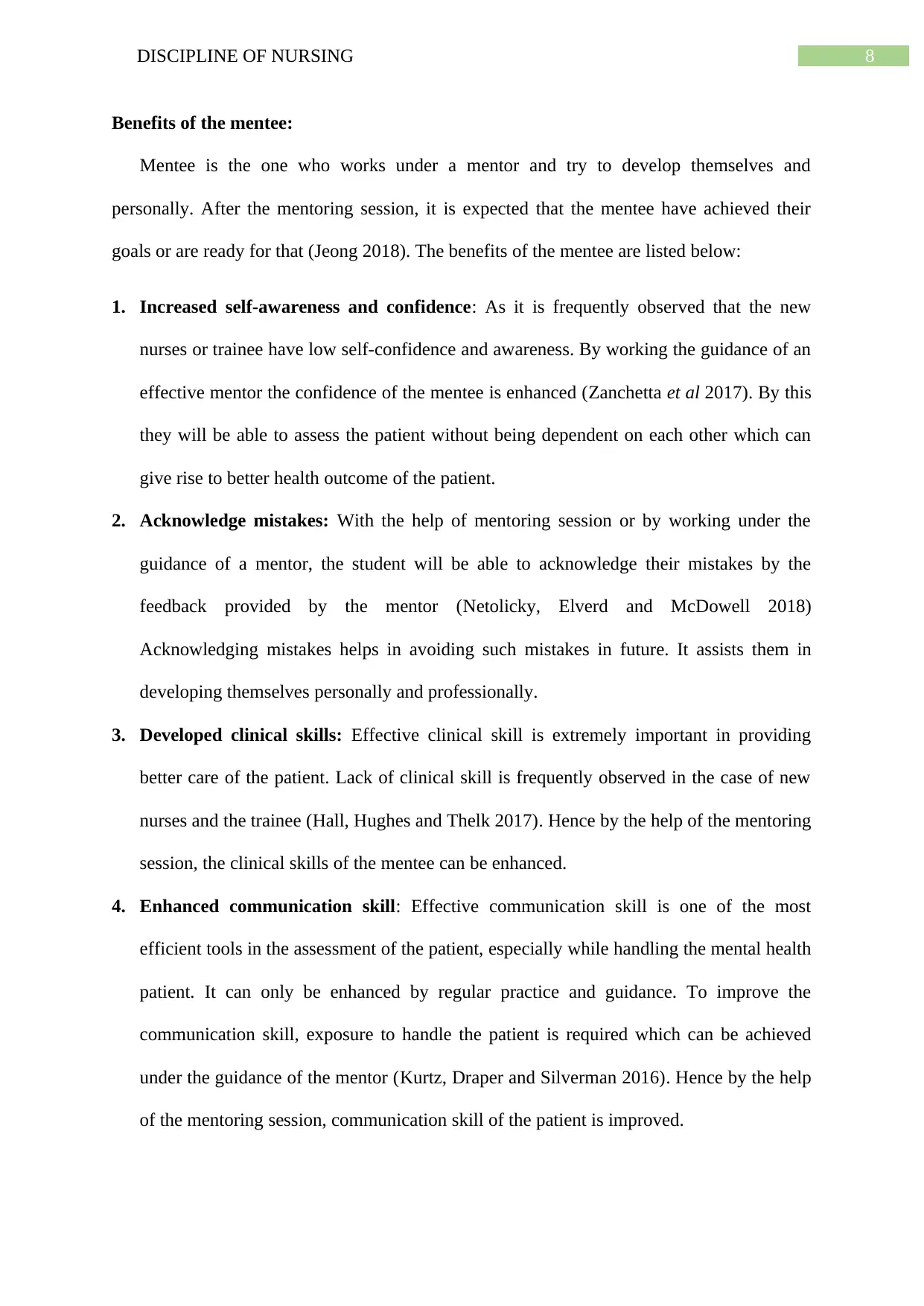
8DISCIPLINE OF NURSING
Benefits of the mentee:
Mentee is the one who works under a mentor and try to develop themselves and
personally. After the mentoring session, it is expected that the mentee have achieved their
goals or are ready for that (Jeong 2018). The benefits of the mentee are listed below:
1. Increased self-awareness and confidence: As it is frequently observed that the new
nurses or trainee have low self-confidence and awareness. By working the guidance of an
effective mentor the confidence of the mentee is enhanced (Zanchetta et al 2017). By this
they will be able to assess the patient without being dependent on each other which can
give rise to better health outcome of the patient.
2. Acknowledge mistakes: With the help of mentoring session or by working under the
guidance of a mentor, the student will be able to acknowledge their mistakes by the
feedback provided by the mentor (Netolicky, Elverd and McDowell 2018)
Acknowledging mistakes helps in avoiding such mistakes in future. It assists them in
developing themselves personally and professionally.
3. Developed clinical skills: Effective clinical skill is extremely important in providing
better care of the patient. Lack of clinical skill is frequently observed in the case of new
nurses and the trainee (Hall, Hughes and Thelk 2017). Hence by the help of the mentoring
session, the clinical skills of the mentee can be enhanced.
4. Enhanced communication skill: Effective communication skill is one of the most
efficient tools in the assessment of the patient, especially while handling the mental health
patient. It can only be enhanced by regular practice and guidance. To improve the
communication skill, exposure to handle the patient is required which can be achieved
under the guidance of the mentor (Kurtz, Draper and Silverman 2016). Hence by the help
of the mentoring session, communication skill of the patient is improved.
Benefits of the mentee:
Mentee is the one who works under a mentor and try to develop themselves and
personally. After the mentoring session, it is expected that the mentee have achieved their
goals or are ready for that (Jeong 2018). The benefits of the mentee are listed below:
1. Increased self-awareness and confidence: As it is frequently observed that the new
nurses or trainee have low self-confidence and awareness. By working the guidance of an
effective mentor the confidence of the mentee is enhanced (Zanchetta et al 2017). By this
they will be able to assess the patient without being dependent on each other which can
give rise to better health outcome of the patient.
2. Acknowledge mistakes: With the help of mentoring session or by working under the
guidance of a mentor, the student will be able to acknowledge their mistakes by the
feedback provided by the mentor (Netolicky, Elverd and McDowell 2018)
Acknowledging mistakes helps in avoiding such mistakes in future. It assists them in
developing themselves personally and professionally.
3. Developed clinical skills: Effective clinical skill is extremely important in providing
better care of the patient. Lack of clinical skill is frequently observed in the case of new
nurses and the trainee (Hall, Hughes and Thelk 2017). Hence by the help of the mentoring
session, the clinical skills of the mentee can be enhanced.
4. Enhanced communication skill: Effective communication skill is one of the most
efficient tools in the assessment of the patient, especially while handling the mental health
patient. It can only be enhanced by regular practice and guidance. To improve the
communication skill, exposure to handle the patient is required which can be achieved
under the guidance of the mentor (Kurtz, Draper and Silverman 2016). Hence by the help
of the mentoring session, communication skill of the patient is improved.
⊘ This is a preview!⊘
Do you want full access?
Subscribe today to unlock all pages.

Trusted by 1+ million students worldwide
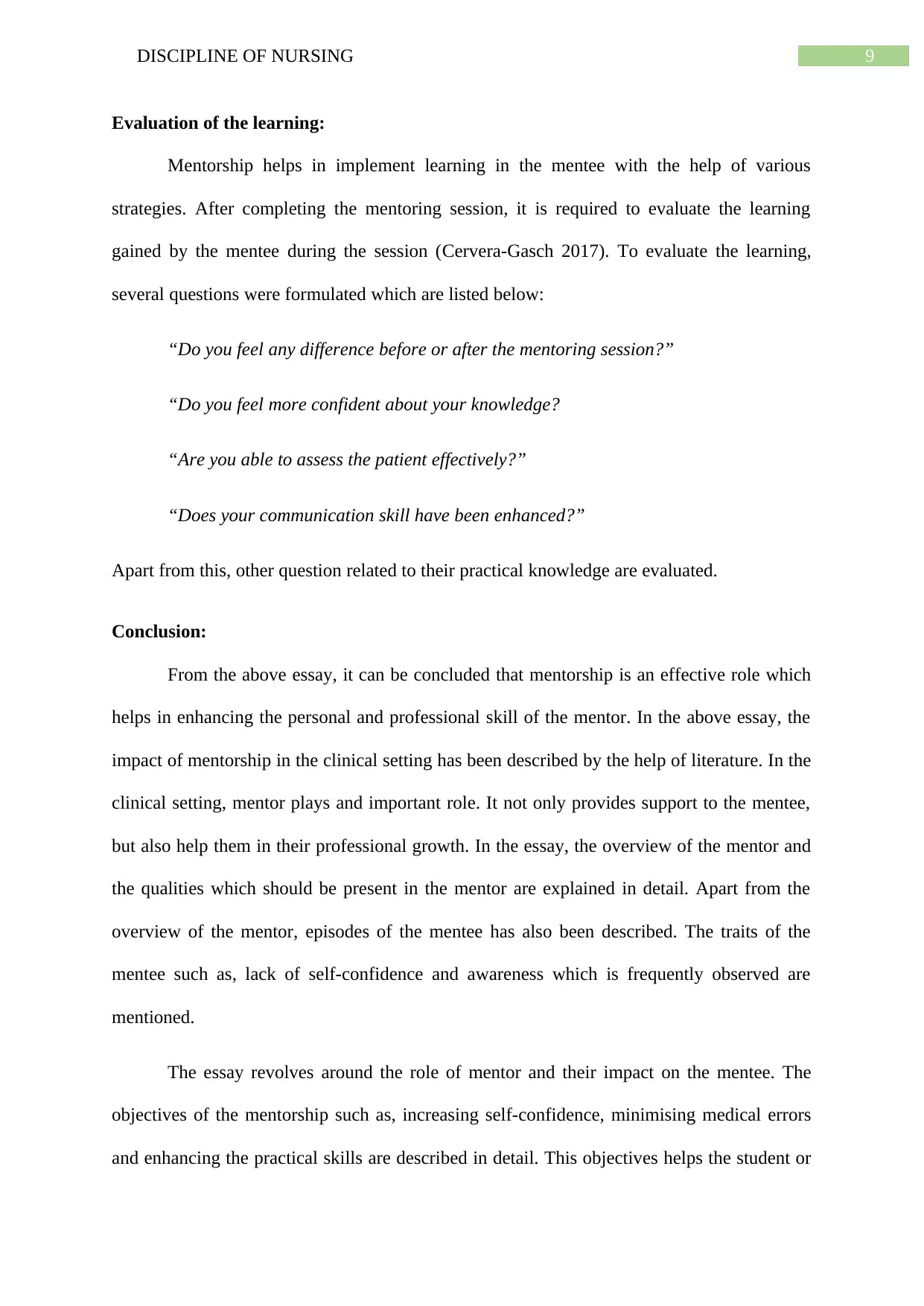
9DISCIPLINE OF NURSING
Evaluation of the learning:
Mentorship helps in implement learning in the mentee with the help of various
strategies. After completing the mentoring session, it is required to evaluate the learning
gained by the mentee during the session (Cervera-Gasch 2017). To evaluate the learning,
several questions were formulated which are listed below:
“Do you feel any difference before or after the mentoring session?”
“Do you feel more confident about your knowledge?
“Are you able to assess the patient effectively?”
“Does your communication skill have been enhanced?”
Apart from this, other question related to their practical knowledge are evaluated.
Conclusion:
From the above essay, it can be concluded that mentorship is an effective role which
helps in enhancing the personal and professional skill of the mentor. In the above essay, the
impact of mentorship in the clinical setting has been described by the help of literature. In the
clinical setting, mentor plays and important role. It not only provides support to the mentee,
but also help them in their professional growth. In the essay, the overview of the mentor and
the qualities which should be present in the mentor are explained in detail. Apart from the
overview of the mentor, episodes of the mentee has also been described. The traits of the
mentee such as, lack of self-confidence and awareness which is frequently observed are
mentioned.
The essay revolves around the role of mentor and their impact on the mentee. The
objectives of the mentorship such as, increasing self-confidence, minimising medical errors
and enhancing the practical skills are described in detail. This objectives helps the student or
Evaluation of the learning:
Mentorship helps in implement learning in the mentee with the help of various
strategies. After completing the mentoring session, it is required to evaluate the learning
gained by the mentee during the session (Cervera-Gasch 2017). To evaluate the learning,
several questions were formulated which are listed below:
“Do you feel any difference before or after the mentoring session?”
“Do you feel more confident about your knowledge?
“Are you able to assess the patient effectively?”
“Does your communication skill have been enhanced?”
Apart from this, other question related to their practical knowledge are evaluated.
Conclusion:
From the above essay, it can be concluded that mentorship is an effective role which
helps in enhancing the personal and professional skill of the mentor. In the above essay, the
impact of mentorship in the clinical setting has been described by the help of literature. In the
clinical setting, mentor plays and important role. It not only provides support to the mentee,
but also help them in their professional growth. In the essay, the overview of the mentor and
the qualities which should be present in the mentor are explained in detail. Apart from the
overview of the mentor, episodes of the mentee has also been described. The traits of the
mentee such as, lack of self-confidence and awareness which is frequently observed are
mentioned.
The essay revolves around the role of mentor and their impact on the mentee. The
objectives of the mentorship such as, increasing self-confidence, minimising medical errors
and enhancing the practical skills are described in detail. This objectives helps the student or
Paraphrase This Document
Need a fresh take? Get an instant paraphrase of this document with our AI Paraphraser
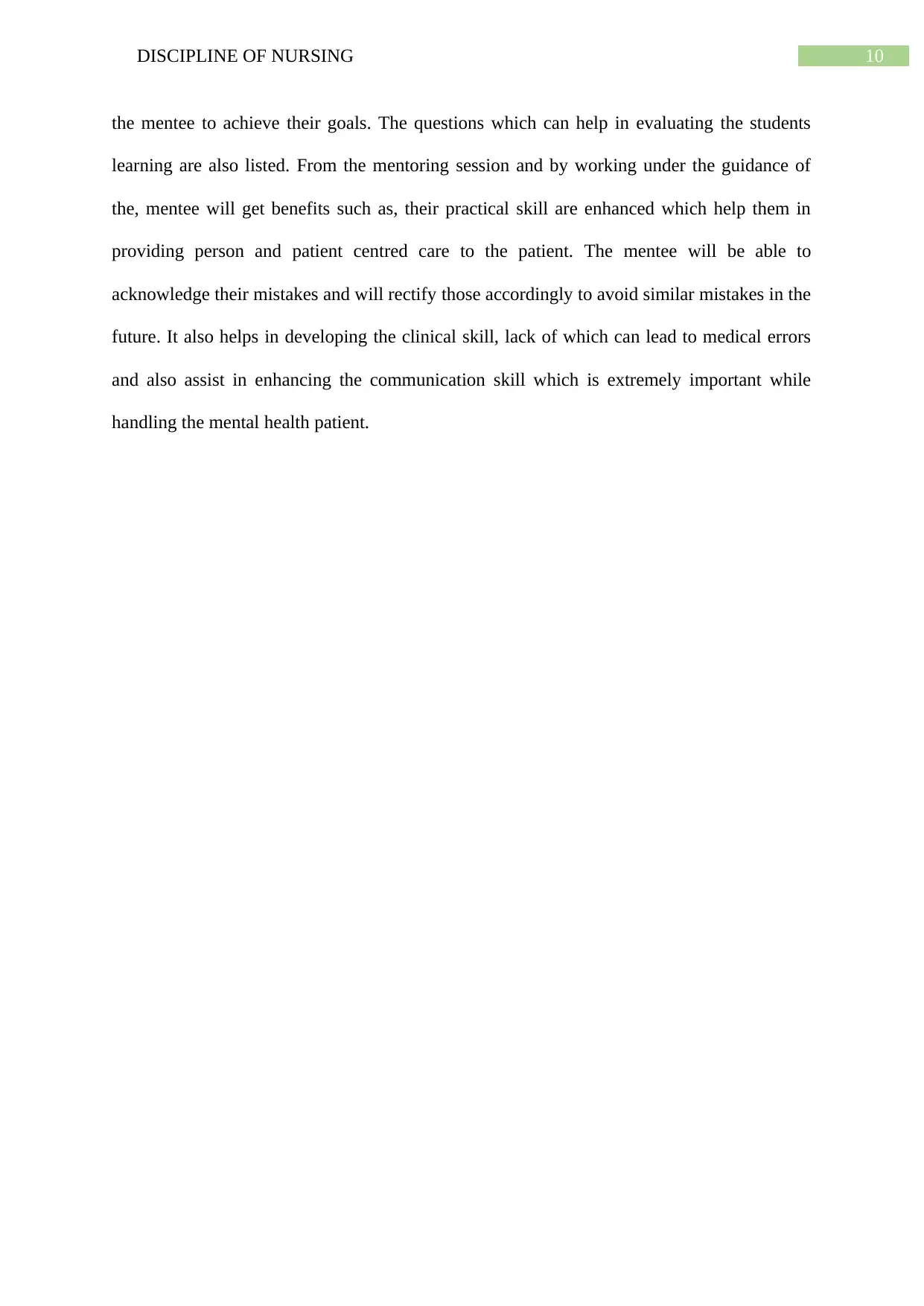
10DISCIPLINE OF NURSING
the mentee to achieve their goals. The questions which can help in evaluating the students
learning are also listed. From the mentoring session and by working under the guidance of
the, mentee will get benefits such as, their practical skill are enhanced which help them in
providing person and patient centred care to the patient. The mentee will be able to
acknowledge their mistakes and will rectify those accordingly to avoid similar mistakes in the
future. It also helps in developing the clinical skill, lack of which can lead to medical errors
and also assist in enhancing the communication skill which is extremely important while
handling the mental health patient.
the mentee to achieve their goals. The questions which can help in evaluating the students
learning are also listed. From the mentoring session and by working under the guidance of
the, mentee will get benefits such as, their practical skill are enhanced which help them in
providing person and patient centred care to the patient. The mentee will be able to
acknowledge their mistakes and will rectify those accordingly to avoid similar mistakes in the
future. It also helps in developing the clinical skill, lack of which can lead to medical errors
and also assist in enhancing the communication skill which is extremely important while
handling the mental health patient.
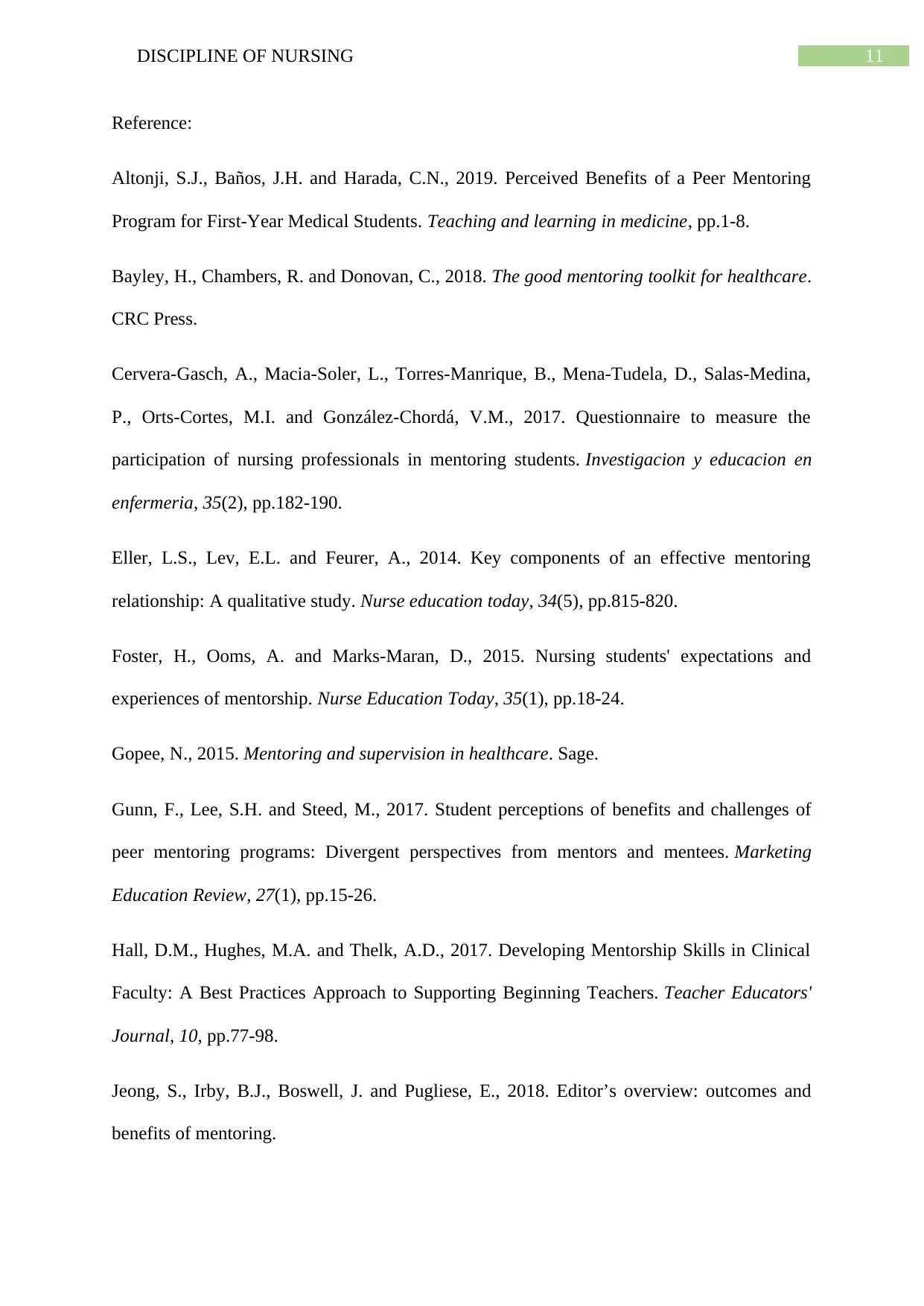
11DISCIPLINE OF NURSING
Reference:
Altonji, S.J., Baños, J.H. and Harada, C.N., 2019. Perceived Benefits of a Peer Mentoring
Program for First-Year Medical Students. Teaching and learning in medicine, pp.1-8.
Bayley, H., Chambers, R. and Donovan, C., 2018. The good mentoring toolkit for healthcare.
CRC Press.
Cervera-Gasch, A., Macia-Soler, L., Torres-Manrique, B., Mena-Tudela, D., Salas-Medina,
P., Orts-Cortes, M.I. and González-Chordá, V.M., 2017. Questionnaire to measure the
participation of nursing professionals in mentoring students. Investigacion y educacion en
enfermeria, 35(2), pp.182-190.
Eller, L.S., Lev, E.L. and Feurer, A., 2014. Key components of an effective mentoring
relationship: A qualitative study. Nurse education today, 34(5), pp.815-820.
Foster, H., Ooms, A. and Marks-Maran, D., 2015. Nursing students' expectations and
experiences of mentorship. Nurse Education Today, 35(1), pp.18-24.
Gopee, N., 2015. Mentoring and supervision in healthcare. Sage.
Gunn, F., Lee, S.H. and Steed, M., 2017. Student perceptions of benefits and challenges of
peer mentoring programs: Divergent perspectives from mentors and mentees. Marketing
Education Review, 27(1), pp.15-26.
Hall, D.M., Hughes, M.A. and Thelk, A.D., 2017. Developing Mentorship Skills in Clinical
Faculty: A Best Practices Approach to Supporting Beginning Teachers. Teacher Educators'
Journal, 10, pp.77-98.
Jeong, S., Irby, B.J., Boswell, J. and Pugliese, E., 2018. Editor’s overview: outcomes and
benefits of mentoring.
Reference:
Altonji, S.J., Baños, J.H. and Harada, C.N., 2019. Perceived Benefits of a Peer Mentoring
Program for First-Year Medical Students. Teaching and learning in medicine, pp.1-8.
Bayley, H., Chambers, R. and Donovan, C., 2018. The good mentoring toolkit for healthcare.
CRC Press.
Cervera-Gasch, A., Macia-Soler, L., Torres-Manrique, B., Mena-Tudela, D., Salas-Medina,
P., Orts-Cortes, M.I. and González-Chordá, V.M., 2017. Questionnaire to measure the
participation of nursing professionals in mentoring students. Investigacion y educacion en
enfermeria, 35(2), pp.182-190.
Eller, L.S., Lev, E.L. and Feurer, A., 2014. Key components of an effective mentoring
relationship: A qualitative study. Nurse education today, 34(5), pp.815-820.
Foster, H., Ooms, A. and Marks-Maran, D., 2015. Nursing students' expectations and
experiences of mentorship. Nurse Education Today, 35(1), pp.18-24.
Gopee, N., 2015. Mentoring and supervision in healthcare. Sage.
Gunn, F., Lee, S.H. and Steed, M., 2017. Student perceptions of benefits and challenges of
peer mentoring programs: Divergent perspectives from mentors and mentees. Marketing
Education Review, 27(1), pp.15-26.
Hall, D.M., Hughes, M.A. and Thelk, A.D., 2017. Developing Mentorship Skills in Clinical
Faculty: A Best Practices Approach to Supporting Beginning Teachers. Teacher Educators'
Journal, 10, pp.77-98.
Jeong, S., Irby, B.J., Boswell, J. and Pugliese, E., 2018. Editor’s overview: outcomes and
benefits of mentoring.
⊘ This is a preview!⊘
Do you want full access?
Subscribe today to unlock all pages.

Trusted by 1+ million students worldwide
1 out of 15
Related Documents
Your All-in-One AI-Powered Toolkit for Academic Success.
+13062052269
info@desklib.com
Available 24*7 on WhatsApp / Email
![[object Object]](/_next/static/media/star-bottom.7253800d.svg)
Unlock your academic potential
Copyright © 2020–2026 A2Z Services. All Rights Reserved. Developed and managed by ZUCOL.





